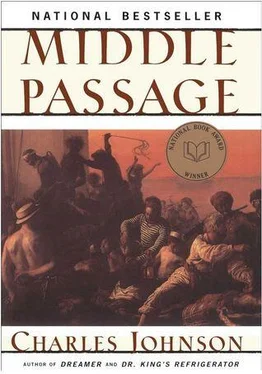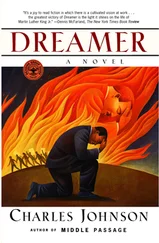Charles Johnson - Middle Passage
Здесь есть возможность читать онлайн «Charles Johnson - Middle Passage» весь текст электронной книги совершенно бесплатно (целиком полную версию без сокращений). В некоторых случаях можно слушать аудио, скачать через торрент в формате fb2 и присутствует краткое содержание. Год выпуска: 2012, Издательство: Scribner, Жанр: Современная проза, на английском языке. Описание произведения, (предисловие) а так же отзывы посетителей доступны на портале библиотеки ЛибКат.
- Название:Middle Passage
- Автор:
- Издательство:Scribner
- Жанр:
- Год:2012
- ISBN:нет данных
- Рейтинг книги:5 / 5. Голосов: 1
-
Избранное:Добавить в избранное
- Отзывы:
-
Ваша оценка:
- 100
- 1
- 2
- 3
- 4
- 5
Middle Passage: краткое содержание, описание и аннотация
Предлагаем к чтению аннотацию, описание, краткое содержание или предисловие (зависит от того, что написал сам автор книги «Middle Passage»). Если вы не нашли необходимую информацию о книге — напишите в комментариях, мы постараемся отыскать её.
a slave ship en route to collect members of a legendary African tribe, the Allmuseri. Thus begins a daring voyage of horror and self-discovery.
Peopled with vivid and unforgettable characters, nimble in its interplay of comedy and serious ideas, this dazzling modern classic is a perfect blend of the picaresque tale, historical romance, sea yarn, slave narrative, and philosophical novel.
Middle Passage — читать онлайн бесплатно полную книгу (весь текст) целиком
Ниже представлен текст книги, разбитый по страницам. Система сохранения места последней прочитанной страницы, позволяет с удобством читать онлайн бесплатно книгу «Middle Passage», без необходимости каждый раз заново искать на чём Вы остановились. Поставьте закладку, и сможете в любой момент перейти на страницу, на которой закончили чтение.
Интервал:
Закладка:
He really meant all that. As will happen with a man of his beliefs, he saw the sickness upon us as a moral plague and held himself responsible for our suffering. The aftermath of the mutiny stopped his spirit cold. Riveted it. Nailed him fast. He had slipped into relativity. He could not move forward, and thus lost ground to Diamelo day by day. (But I must add he kept us alive by not telling Diamelo all he had learned at the helm.) It all had to do with an old Allmuseri belief (hardly understood by one Westerner in a hundred) that each man outpictured his world from deep within his own heart. A fortnight ago he had thought murder and lo! the mutiny was manifest, as if a man’s soul was an alchemical cauldron where material events were fashioned from the raw stuff of feelings and ideas. That meant an orthodox Allmuseri, as he was, had to watch himself twenty-five hours a day and police his heart. As within, so it was without. More specifically: What came out of us, not what went in, made us clean or unclean. Their notion of “experience,” I learned, held each man utterly responsible for his own happiness or sorrow, for the emptiness of his world or its abundance, even for his dreams and his entire way of seeing, so that an Allmuseri pauper might be rich if his heart was clear, and their kings impoverished if they harbored within themselves hunger, grievances, or hatred, as Ngonyama had done toward the crew, wishing misery and death upon them. All that, it seemed, had flown back upon him like spit hurled at an enemy against the wind. And now Ngonyama grieved less over what lay ahead of us than what lay in the immediate past, this rift, this vast rupture he had caused within himself by permitting the execution of so many.
Never a night passed but I entered the quiet, disheveled fo’c’s’le — full of mildewed clothing and rusted weapons covered with fungi — and, standing at the room’s center, imagined I heard those murdered tars: McGaffin’s snarl; fetching music from Tommy’s flute; the yammering of Fletcher and Meadows; and the nerve-jarring Har! Har! of forty pirates in a gin-duel. As I struggled to describe every detail of our passage in the captain’s log, I longed for the crewmen lost to fill the ship’s room again, for our lonely drifting to disappear, and, as in a dream, delivering me back to Isadora’s sitting room, where I would set my teacup clicking down on her candlestand, cross the carpeted floor on my knees, and bury my face in her skirts, begging her to take me in and forgive my idiot blathering about wanting excitement and saying all the beautiful things I’d meant to tell her to balance how I’d hurt her sometimes. Like a wife she would watch me closely to see my reactions to the portraits of women in popular magazines, or on the street, faintly jealous if I stared at them too long, but never showing it, wounded but too proud to let on that I had brought her pain, this woman who, I knew, had paid my bills back home. And it came to me, there in the darkened room, that perhaps Papa was right and there were only two kinds of people in the New World: debtors such as I had been all my days and those who, like Isadora, paid the rent for all the rest. But the dream never doorwayed into her rooms, and the furnishings of the fo’c’s’le took on a grim finality or gave me such a feeling of there being nothing beyond these groaning timbers, this endless sea, that I wept shamelessly like a child.
“Ruth’ford,” said Baleka, catching me like this. “Can I get you anythin’?”
I blew my nose. Croaked: “Dry socks.”
She hung back, a little rattled to see me blubbering and biting my nails, her hair tucked under an African headwrap or gele, as their women called them. As with all Allmuseri children, Baleka never displayed her feelings directly. Frankness was a Western virtue that offended the blacks a time or two. She policed herself from doing or saying anything that might displease others. Thus Baleka could only be read at angles by paying attention to the subtlest of vibrational shifts in her voice, the slight emotional spin she put on ceremonial action, the nearly imperceptible imprint her feelings left, like heat from hands on glass, upon Tribal behavior so ritualized, seasoned, and spiced by the palm oil, the presence of others it virtually rendered the single performer invisible — or, put another way, blended them into an action so common the one and many were as indistinguishable as ocean and wave. I wondered if she thought it weak for a grown man, a Westerner, to weep. Turning my back to her, I blew my nose on the hem of my blouse, and said, “Yes?” My voice croaked. “What is it?”
“It’s your turn to feed it.”
Baleka looked at her bare feet. Instantly, I knew what she meant: the creature Falcon had captured had to be fed. Every day it had to eat. Heretofore, the more pious of the Allmuseri had done this, but eventually the duty fell to everyone. I was the first of the Americans luffed in for the chore. But on what did it feed? None of the Africans who went alow had been with it for more than fifteen minutes. None had taken food. It was a duty I dreaded. Still, I felt compelled to see what sort of cargo Falcon had believed would make his fortune shoreside and, just maybe, hasten the millennium.
Weakly, then, feeling unsteady in my spine, fearful that perhaps I, too, had the first signs of sickness, I descended into the chamber with a glim and rope tied at my waist. The darkness there was blacker than chimney soot. There, where the scuttles were closed, the smell rivaled stagnant water in a swamp. The air was stale, potted. The silence was so heavy I swear you could hear a maggot pump ship on sailcloth. No wind stirred within these walls, but the flame of my lantern swayed violently as if things were stalking to and fro. My chest began to ache. Feeling the urge to vomit, a backwash of fluids in my throat, I bent forward, but nothing came, and now I was so weak I could neither stand nor sit, and simply lay still. About five paces to my right was the box. Otherwise, I saw nothing. Something was off, my nerves told me. I felt an edge on the air, a skin-prickling charge like that before an electrical storm, the chamber releasing an elemental whiff of something just spoiling to happen: catastrophe hunkering, fleetingly visible in the corner of the eye. And then, as if cued to the gathering chaos I felt within, the crate opened and from it stepped a dark man, his features striking in the stylized way of Benin sculpture, the bone in the bridge of his nose boldly cut, his cap of short hair a mosaic of burls. This, I knew without noting another detail, was the dangerous, shape-shifting god of the Allmuseri. And I knew the infernal creature — this being who delighted in divesting men of their minds — had chosen to present itself to me in the form of the one man with whom I had bloody, unfinished business: the runaway slave from Reverend Chandler’s farm — my father, the fugitive Riley Calhoun.
Entry, the eighth AUGUST 1, 1830
Visiting the village of the Allmuseri, the Spanish explorer Rafael Garcia was driven mad. I now knew why. I glimpsed the creature, coal black and squatting on stubbly legs, as you might see objects through clouded glass. This blistering vision licked itself clean, as cats do, and had other beings, whole cultures of them, living parasitically on its body. Do I exaggerate? Not at all. It stood before me mute as a mountain, preferring not to speak, I suspected, because to say anything was to fall short of ever saying enough. (Within its contours my father’s incarnation was trapped like a ship in a bottle, contained in a silence where all was possibility, perfection, pre-formed.) It was top-heavy. All head. Luscious hair fell past protruding eyes and a nose broad as a mallet, and framed a grin stretched in hysterical laughter, bunching skin on its cheeks into a hundred mirthful folds: a ceremonial mask from Gambia, I guessed, but it’s safe to say I was hardly in my right mind. Nausea plummeted from my belly straight down to my balls, drawing tight the skin along my scrotum. I came within a hair’s-breadth of collapsing, for this god, or devil, had dressed itself in the flesh of my father. That is what I mostly saw, and for the life of me I could no more separate the two, deserting father and divine monster, than I could sort wave from sea. Nor something more phantasmal that forever confused my lineage as a marginalized American colored man. To wit, his gradual unfoldment before me, a seriality of images I could not stare at straight on but only take in furtive glimpses, because the god, like a griot asked one item of tribal history, which he could only recite by reeling forth the entire story of his people, could not bring forth this one man’s life without delivering as well the complete content of the antecedent universe to which my father, as a single thread, belonged.
Читать дальшеИнтервал:
Закладка:
Похожие книги на «Middle Passage»
Представляем Вашему вниманию похожие книги на «Middle Passage» списком для выбора. Мы отобрали схожую по названию и смыслу литературу в надежде предоставить читателям больше вариантов отыскать новые, интересные, ещё непрочитанные произведения.
Обсуждение, отзывы о книге «Middle Passage» и просто собственные мнения читателей. Оставьте ваши комментарии, напишите, что Вы думаете о произведении, его смысле или главных героях. Укажите что конкретно понравилось, а что нет, и почему Вы так считаете.












